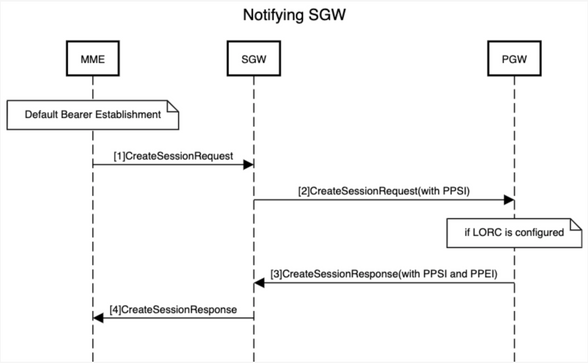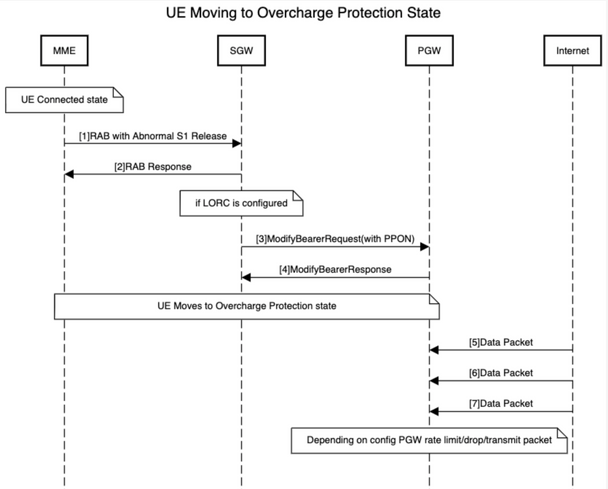Introduction
This document describes the Overcharging Protection feature in the Serving Gateway (SGW) and Packet Data Network Gateway (PGW). This licensed feature helps to avoid overcharging a subscriber for dropped packets while the user equipment (UE) is in idle mode.
Problem
Subscribers might be overcharged because of buffer overflow or a delay in paging at the time of EPS Connection Management (ECM)-IDLE mode Downlink (DL) data forwarding. There could be discrepancies in the SGW and PGW charging records. This document explains how to prevent such overcharges.
Solution
Idle Mode DL Data Flow
The UE is in the ECM-IDLE mode when there is no Non-Access Stratum (NAS) that signals a connection between the UE and the network. Usually, the Evolved Packet Core (EPC) UE moves to the ECM-IDLE state because of different ENodeB and Mobility Management Entity (MME) initiated scenarios. Most commonly, when the UE inactivity timer expires.

At the time of the ECM-IDLE Mode, there could be DL data that comes in from the Internet for the UE. These packets will hit the PGW first. The PGW will forward these packets to the SGW after suitable accounting of the bytes. Once the SGW receives the data, it buffers the incoming packets. After it identifies that the UE is in idle mode, it starts the Downlink Data Notification (DDN) procedure to MME and MME initiates paging for the UE.

If, in this scenario, the DL packets are not forwarded to the UE because of a paging delay, the SGW buffer might overflow because of a DDN failure. Int this case, the UE might be overcharged. The Overcharging Protection feature would handle such a scenario and protect it from overcharging the customer. This is in accordance with 3GPP TS 29.274.
Overcharging Protection Support in SGW and PGW
- The PGW is not aware of the UE state and whether the UE is in idle mode or connected mode. The PGW will charge data, even when the UE is in idle mode.
- The purpose of this feature is to prevent overcharging at the PGW when the UE goes to idle mode.
- There could be scenarios where the DL data for an idle mode UE might get dropped at the SGW due to buffer overflow, delay in paging, or possibly because of DDN failure. Without this feature, the PGW will charge for those bytes of data.
- This particular feature will prevent overcharging of UE. The SGW will inform the PGW to stop or resume charging based on packets dropped at the SGW or based on DDN failure.
- Once the trigger threshold is mitigated, the SGW will send a "PPOFF" indication to the PGW. The PGW will then send packets at a normal rate.
Feature Details
This feature can be triggered by Packet Drop Limit or DDN Failure Threshold configured in the SGW. This document is prepared taking Release 21.X and earlier into consideration.
Documentation
For more information, see P-GW Administration Guide, StarOS Release 21.1.
The operator can specify these thresholds at the SGW for this feature:
- Dropped number of packets or bytes
- DDN failure notification
If this feature is enabled at the PGW, it indicates that it supports PDN Gateway pause of charging to the SGW in these messages:
- Create Session Response for Default Bearer Creation
- MBR Response for TAU/RAU/Handover with SGW Change
This feature makes use of these Information Elements (IEs), as per 3GPP TS 29.274 section 8.12.

“PPOFF (PDN Pause Off Indication)” flag is proposed in the Indication IE.
”PPON (PDN Pause On Indication) / PPEI (PDN Pause Enabled Indication)” flag is proposed in the Indication IE.
“PDN Pause Support Indication (PPSI)” flag is proposed in the Indication IE.
The SGW will keep the peer PGWs support of Overcharging Protection capability. If the peer PGW supports Overcharging Protection and the configured threshold at the SGW is met, it will send the Modify Bearer Request with “PPON” indication to the PGW. Upon receipt of such an indication, the PGW will rate-limit the DL data to the SGW.
Support Indication by the SGW
The PGW will come to know about the peer SGW capabilities through the:
- PPSI flag in the Indication IE in the Create Session Request message during the initial attach.
- PPSI flag in the Indication IE in the Modify Bearer Request during the TAU/RAU/Handover with the SGW change.
Support Indication by the PGW
The PGW will inform the SGW about its capabilities through the:
- PPSI and PPEI flags in the Indication IE in the Create Session Response message during the initial attach.
- PPSI and PPEI flags in the Indication IE in the Modify Bearer Response during the TAU/RAU/Handover.

Pause and Resume Charging Indication from the SGW
The UE moves to Overcharge Protection Mode.

The UE moves out of Overcharge Protection Mode.

Configuration of Overcharging Protection at the PGW
In the PGW service:
# config
(config)# context <>
(config-ctx)# pgw-service <>
(config-pgw-service)# egtp overcharge-protection
drop-all - Configures overcharge protection to drop all packets received
transmit-all - Configures overcharge protection to send all packets received
<cr> - newline
In an APN configuration:
#config
(config)#context <>
(config-ctx)#apn <>
(config-apn)#egtp overcharge-protection
drop-all - Configures overcharge protection to drop all packets received
transmit-all - Configures overcharge protection to send all packets received
<cr> - newline
The APN configuration will take priority over the PGW service. The previous configuration will trigger the PGW to send "pause charging" support to the SGW.
Configuration of Overcharging Protection at the SGW
#config
(config)#apn-profile <>
(apn-profile-xxx)#overcharge-protection
abnormal-s1-release - triggers overcharging protection on abnormal s1 release
ddn-failure - triggers overcharging protection on ddn failure
drop-limit - configure packet/bytes drop count to trigger pause charging
- abnormal-s1-release (for future use) - If overcharging protection is enabled for abnormal-s1-release, the SGW would send MBR to pause charging at the PGW if abnormal release of Radio Link signal occurs from MME.
- ddn-failure - If overcharging protection is enabled for the ddn-failure message, MBR would be sent to the PGW to pause charging upon receipt of the DDN failure from MME/S4-SGSN.
- drop-limit - drop_limit_value { packets | bytes } } Send MBR to pause charging at the PGW if a specified number of packets/bytes is dropped for a PDN connection.
drop_limit_value is an integer from 1 through 99999
packets - configures drop-limit in packets
bytes - configures drop-limit in bytes
The SGW will trigger "PPON" in Modify Bearer Request once any of those conditions are met.
Troubleshoot Overcharging Protection
Show Commands
#show apn-profile full name <> | grep -i overcharging
Overcharging protection for packet drop count : Not Configured
Overcharging protection for byte drop count : 20
Overcharging protection for s1 abnormal release : Not Configured
Overcharging protection for DDN failure : PAUSE-CHARGING
#show sgw-service statistics name <>
The output from these show commands depicts the overcharging protection statistics in the PGW.
- show subscribers pgw-only full all
- show subscribers <summary>|<full>
- show pgw-service statistics all
- show apn statistics all
